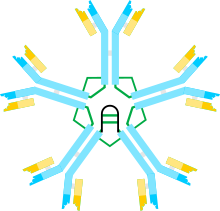
Macroglobulins are large globular proteins and are found in the blood and other body fluids. Various physiological processes, including immunity, coagulation, and chemical transport, rely on these proteins. A macroglobulin is a plasma globulin of high molecular weight.[1] Elevated levels of macroglobulins (macroglobulinemia) may cause manifestations of excess blood viscosity (as is the case for IgM antibodies in Waldenström macroglobulinemia) and/or precipitate within blood vessels when temperature drops (as in cryoglobulinaemia). Other macroglobulins include α2-macroglobulin, which is elevated in nephrotic syndrome, diabetes, severe burns, and other conditions, while a deficiency is associated with chronic obstructive pulmonary disease.
- ^ "Definition: macroglobulin from Online Medical Dictionary". Archived from the original on June 24, 2008.